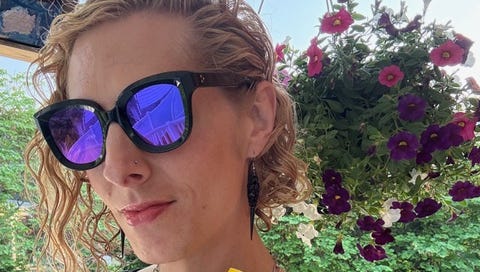What is philosophy to you?
Philosophy is dedicated to making sense of our lives and hopefully improving our lives. Philosophy can disrupt established patterns of life and thought by generating new questions, providing socio-historical perspective, and crossing disciplinary boundaries. My teaching and writing approaches this through AI, food, and words. So, I ask, how does communication work? When it does, how is it caught up in rendering marginalized people less intelligible and even unintelligible? How does this rendering benefit dominant groups? This approach forces us to reconcile the diversity, joys, and perils of human life with the narrowness of the philosophical canon. It also forces us to acknowledge that philosophical inquiry cannot be separated from the political tides we swim in. This week, my collaborator Ding and I launched a new zine, Being Trans in Philosophy, with issue #0. It collects 22 first-personal accounts of what it is actually like to be trans or have trans kids as a philosopher. It grapples with our discipline’s role in providing intellectual cover for a global anti-trans moral panic.
Sometimes, philosophy is about questioning philosophy, and I love that for us.
How were you first introduced to philosophy?
In high school, I was reading Lorraine Hansberry, Malcom X, Howard Zinn, and Leslie Feinberg. I chanced upon public talks by Russell Means and Edward Said. I was in existential despair about living as a man. I explored, railed, and rebelled, but ultimately, inescapable violence, threats, and harassment put me in my gender cell. As MLK, Malcom X, Bertrand Russell, and now Jennifer Lackey have shown, philosophy is a way of coping with that kind of confinement. Sometimes, it’s a means to freedom. A queer art teacher taught me how to survive. Weirdly, that brought me to Kant’s epistemology and aesthetics. It taught me the safety of establishment abstraction.
At the University of New Mexico, I found a diverse range of courses. When I transferred to Amherst College, everything focused on the analytic canon. In two years, I managed to take 12 philosophy and linguistics classes across Amherst, UMass, Hampshire, Mt. Holyoke, and Smith. We formed a 5 Colleges Philosophy Club, and this was my most crucial introduction to what it meant to do philosophy as a community. We had a little conference, and I remember there being a modal logic talk followed by a talk about the phenomenology of having a vulva and how it is simultaneously shaped by embodiment and socialization. I remember thinking, “I want to do all of this for as long as I can”.
How do you practice philosophy today?
I have reshaped my specialization in technical philosophy of language to speak to the life I now live, and the community that makes my life possible. If other LGBTQ+ people, disabled people, women, immigrants, and people of color do not see something of value and resonance in my work, then I know I’m off-track.
At the Eastern APA this past year, me and my collaborator Adriene Takaoka gave a talk titled “How to Fuck with Words” for the Committee on LGBTQ+ people in the profession. We documented how queer people flexibly deploy various labels for our bodies, desires, practices, and identities. We argued that this fluid, negotiated lexicon of the erotic is only possible with the kind of implicit embodied socialized competence that Bourdieu calls ‘bodily hexis’. An upshot of this is that we must resist the forces of dating apps and social media, which reinforce simplistic, rigid, and static identity labels. Instead, we distinguish linguistic gatekeeping from situational boundary-setting by fluent in-group members. Finally, drawing on Audre Lorde, we argued that this fluidity and flexibility are an essential form of cultural and political resistance for marginalized groups against dominant ones. Gauging by the laughter, affection, and requests for the slides to send to lovers, we’re on to something.
What is a philosophical issue that is important to you?
We’ve all heard of Plato’s cave, but have you heard of Du Bois’ cave? In Chapter 5 of Dusk of Dawn, Du Bois examines segregation through a metaphor about communication and intergroup dynamics. He depicts Black folks as entombed in a deep, dark cave, separated from the white world by a thick glass plate. As Black folks attempt to communicate their plight to the white world from the darkness, they are only partially intelligible – unclearly glimpsed and not heard. Their unintelligibility brews desperate gesticulation, and the Black folks hurl their bodies at the glass plate, which is seen by the white world as a humorous spectacle. Those entrapped in the cave can only resort to tribalism and hysteria. But, if they do “break through in blood and disfigurement”, they “find themselves faced by a horrified, implacable, and quite overwhelming mob of people frightened for their own very existence” (p.66).
As a trans person, I cannot describe how perfectly and painfully this captures the situation my community faces. As I read him, Du Bois is claiming that the infrastructure of our society can render a whole subordinated group unintelligible in a way that benefits the dominant group. There is a large literature on this, but I do not think it has pinpointed the central mechanism at work. I am currently writing a book called Two Faces: how communication connects us and harms us, which argues that social norms are that mechanism. They not only shape what we do together, but also how we interpret each other. This forges a link between the values embodied by a social group’s identities, practices, and interpretive resources.
What books, podcasts, or other media have stood out to you as a philosopher?
Let me focus on newish things! I really like the Journal of Sociolinguistics podcast JSLX Conversations. One of my sociologist friends also recommended the book Long Live Queer Nightlife by Amin Ghaziani, and it is incredible, beautiful, and joyous – a must read for anyone interested in how marginalized people carve out spaces of pleasure and resistance. On a similar note, the Translash podcast is essential these days. At the Pacific APA, I gave comments on Talia Bettcher’s Beyond Personhood: an essay in trans philosophy, Perry Zurn’s How We Make Each Other: trans life at the edge of the university, and P.J. DiPietro’s Sideways Selves: Travesti and Jotería struggles across the Américas. I can tell you that all three are spectacular, and that we are in a moment of renaissance in trans philosophy.
Closer to my specializations, I really like Sam Hesni’s recent paper “Philosophical Intuitions about Socially Significant Language” in Hypatia, and Sam Berstler’s “The Structure of Open Secrets” in The Philosophical Review. The social revolution in philosophy of language also got its own textbook this year from two of this subfield’s most prominent figures! Ishani Maitra and Mary Kate McGowan’s Words in Action: an introduction to social philosophy of language is just what we needed.
Willow Starr (she/they) is an Associate Professor of Philosophy at Cornell University in Ithaca, NY. She is the author of numerous specialist articles in the philosophy of language, where she argues that language does not just describe the world, but expresses states of mind. She is tiptoeing into more public philosophy, including a guest post on Kate Manne’s More to Hate Substack titled “Seeing Sam Nordquist, Seeing America”. Her current book project is titled Two Faces: how communication connects us and harms us, which should come out in late 2026. In the meantime, she lives in Ithaca with her wife, two kids, and two cats. You could find out more about her work at: https://wstarr.org.







I thought about gently questioning this learnéd linguist's use of the alternate construction, "me and my collaborator." But, as I read on, I wasn't sure from which camp the author would consider my comment came: "linguistic gatekeeping" or "situational boundary-setting"? Then, I realized the author was just fucking with words, and I'm just old school. Playfully on-word, @L
Thanks for the playful engagement. Looks like Céline cleaned up my typos 🙏🏽💖